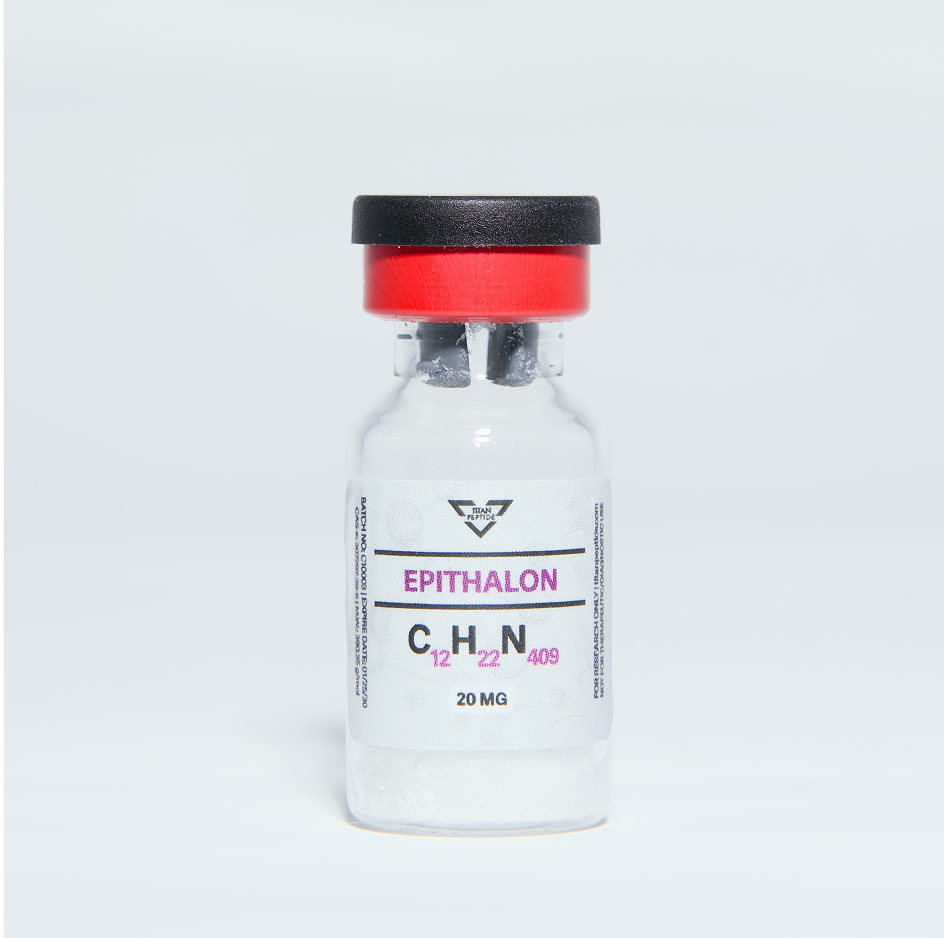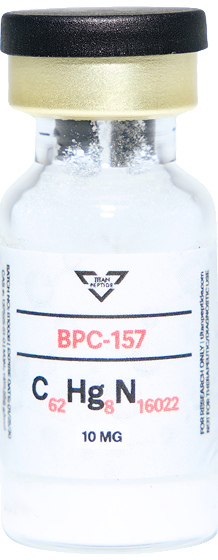

EPITHALON - 20mg
Epithalon (also known as Epitalon or Epithalone) is a synthetic version of the natural polypeptide epithalamin, which is secreted by the pineal gland. In research models, Epithalon is studied for its potential effects on telomerase activation, telomere length maintenance, antioxidant activity, and modulation of circadian rhythms.





A synthetic tetrapeptide analog of epithalamin, modeled for laboratory research.
Epithalon (also known as Epitalon or Epithalone) is a synthetic version of the natural polypeptide epithalamin, which is secreted by the pineal gland. In research models, Epithalon is studied for its potential effects on telomerase activation, telomere length maintenance, antioxidant activity, and modulation of circadian rhythms.
Preclinical studies have examined its role in aging research, cellular regeneration, immune function, and neuroprotection. Epithalon appears to influence gene expression related to cell proliferation and repair, making it of interest in experimental longevity and age-related disease studies.

Titan research and immune system function
Immune System Modulation:
Thymalin is widely studied for its potential role in modulating immune responses in research models, particularly in relation to T-cell activity and immune regulation.
Post-Illness Recovery Models:
Research suggests Thymalin may influence immune system recovery following exposure to viral or bacterial agents in laboratory environments.
Healthy Aging Pathways:
Thymalin has been explored in aging studies for its possible effects on thymic function and immune resilience in age-accelerated models.
Autoimmune Research:
Investigators are examining Thymalin’s effects on immune balance in autoimmune-related experimental settings, including cytokine regulation.
Oncology-Related Studies:
Some studies assess Thymalin’s potential to support immune integrity in models exposed to immunosuppressive agents or cancer-like conditions.
Titan research and immune system function
Thymic Immune Modulation:
Thymalin contains oligopeptides capable of binding DNA/histone sequences to influence T-lymphocyte differentiation, stem cell mobilization, and gene expression, making it relevant in immunological study and aging research
Immunosenescence & Restoration:
Investigated in older patient cohorts and severe infection models (e.g. COVID-19), Thymalin has demonstrated regulatory effects on lymphocyte subsets, cytokine normalization, and reductions in markers like CRP, D-dimer, and IL-6
Tissue Regeneration & Repair Models:
Preliminary research suggests Thymalin may support regenerative pathways via upregulation of hematopoietic proteins and facilitating repair mechanisms in damaged tissues
(1) Khavinson, V. Kh., et al. (2003). Epithalon increases telomerase activity and lifespan in human somatic cells. → Demonstrated activation of telomerase and DNA repair mechanisms in vitro and in human tissues. [Bulletin of Experimental Biology and Medicine, 135(4), 349–351]
(2) Anisimov, V. N., et al. (2002). Effect of peptide Epithalon on biomarkers of aging and lifespan in rodents. → Increased mean lifespan and delayed aging markers in mice with short telomeres.
(3) Khavinson, V. K., & Malinin, V. V. (2005). Peptide regulation of aging: Epithalon in gerontology and geriatrics. → Reported significant improvements in immune parameters, lipid profiles, and circadian regulation within 2–4 weeks of treatment.
.svg)
The graph illustrates the effect of Epithalon on anti-aging markers, including telomerase activity, over four weeks based on human clinical and preclinical data. At Week 1, improvements are modest at 5%, indicating early but minimal changes. By Week 2, the effect rises to 12%, showing a steady upward trend.
By Week 4, the increase reaches 25%, highlighting a more pronounced impact over time. The gradual progression suggests that Epithalon’s benefits on anti-aging markers accumulate slowly, potentially making it more effective with sustained use.
Form:
Lyophilized Powder
Storage (unreconstituted):
- Store at 2–8 °C (refrigerated), protected from light.
- For long-term storage, keep at –20 °C.
- Avoid repeated freeze–thaw cycles.
Reconstitution:
- Reconstitute with sterile water for injection or 0.9% NaCl immediately prior to use. Use aseptic technique.
Storage (after reconstitution):
- Store at 2–8 °C.
- Use within 7–10 days.
- Discard any unused solution after this period.
- Handle under sterile conditions.
- Do not shake vigorously (may cause peptide denaturation).
- Inspect visually for particulate matter or discoloration before use.
Issued for quality verification of tested material.
Feedback highlighting proven outcomes and reliability.













